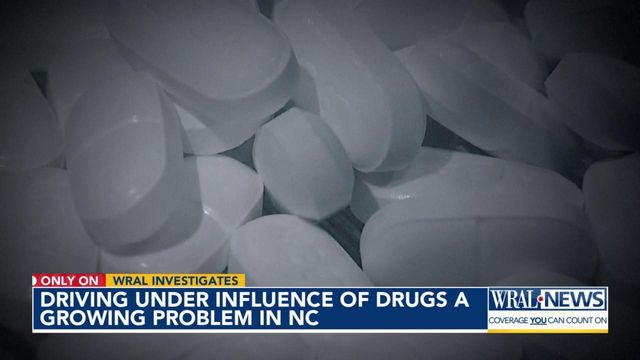'A drastic change': NC law enforcement sees surge in drivers impaired by drugs
Rather than impairment by alcohol, law enforcement officers in North Carolina are seeing an increase in drivers who are impaired by drugs.
"It's becoming a lot more than it used to be," explained Sgt. Devin Rich with the North Carolina State Highway Patrol.
On Feb. 18, Mildo Velasquez was killed in Duplin County by a driver who investigators believe was impaired by marijuana. Raylee Grieco, 19, of Raleigh, was charged with DWI and failure to reduce speed.
Authorities said Velasquez had pulled over on the side of the highway to adjust a trailer on his vehicle. His wife and kids were there and witnessed the deadly collision, according to family who spoke to WRAL's sister station WECT.
“We can’t believe it," said Velasquez's sister-in-law, Estefany Gonzalez. "Sometimes we think it’s just a dream, but he will never come back."
Rich is among members of the NCSHP certified to investigate impairment in such crashes. He has undergone extensive training to become a Drug Recognition Expert (DRE).
Rich explained that, once a trooper on scene determines impairment by drugs is a factor, a DRE is called to the scene to determine what type of substance the driver consumed.
With seven different drug categories ranging from cannabis to inhalants, and many possible indicators or symptoms, Rich said the training is paramount.
The DREs start by examining physical symptoms like blood pressure, heart rate and pupil size.
"It's never easy," Rich said. "It's just you see more and more things so you know what to look for."
After those tests, a blood test will confirm what drugs are in someone's system.
Rich said drivers are most often impaired by cannabis, prescription pills and even over-the-counter THC products bought at gas stations, which WRAL Investigates has reported are not always what they seem.
"They’re not specifically regulated," Rich said. "They may not know what they’re getting. We have seen people who thought they were using Delta 8 and it comes back as Delta 9 in a high level."
Unlike with drunk driving, where there is a clear legal limit of how much can be in your blood if you're going to get behind the wheel, with drugs, there is much more of a gray area.
Rather than there being a certain number, an officer simply has to determine that a person is impaired.
Since drug impairment is subjective, Rich said it can create problems in court - which is why training and thorough reports are so important.
Rich said there are currently 170 DREs in the state across various agencies.
For Rich, the work is personal. He was hit by a drunk driver while working as a deputy sheriff in 2006.
"He ran a stop sign, hit me, put me into a tree," he recalled. "That made me really realize, being a victim, that I need to help make a change for that. Because there are other people who aren’t so lucky."
Those include Velasquez's family, particularly his children, who miss their dad.
"They see the bed. They see his clothes," Gonzalez told WECT. "It's like 'Who's going to wear that? Who am I going to hug? And for him, he's like, when am I going to see my dad?'"












